The Higher Ed Guide To Irresistible Email Subject Lines
November 11, 2017
EasyUni Staff

If you’re habitually trashing the bulk of your inbox, you’re not alone. After years of being inundated with spam, we’ve all become increasingly untrusting of unsolicited mail. Here’s a snapshot of last years’ spam rates from a Kaspersky Lab report:

With well over half of our mail indexed as spam, it’s no wonder we’ve taken to auto-trashing! And although the numbers have decreased a bit in 2014 – down to about 66% – we’re no more eager to open mail we haven’t explicitly asked for.
Extra Hurdles for Higher-Ed Emailers
And for higher ed marketers hoping to reach prospective and current students, the challenge may well be even greater. Post-secondary hopefuls are more social media connected than ever – so your college recruitment team will have to work extra hard to be heard over a chorus of social media notifications, commercial messages, and competing email marketing campaigns. If you can convince leads to click on your school’s message, half the battle is won. So, crafting trash-proof subject lines is an essential component of your overall student recruitment strategy. Is there a simple recipe for success?
Contrary to what a Google search on the subject will tell you, there are few hard and fast rules for creating click-worthy subject lines. Rather than relying on a one-size-fits-all approach, we know that ALL good content begins with consulting your college’s target student personas – which are of course unique and diverse. Once you’ve pinned down precisely who you’re writing to, there are a few fundamentals to consider when launching your next email marketing campaign:
Enticement + Clarity = Higher Student Open Rates
It’s a tricky balancing act – creating enticing emails that are also clear enough in their intent to actually get opened. Many how-to’s focus on the power of “mysterious” subject lines to get more clicks, claiming that merely wanting to know more will compel recipients to open the message. They might suggest a subject line like this for your school’s campaign:

There’s a question to elicit further interest, a bit of mystery surrounding the offer… seems pretty enticing right? Well, not exactly. According to Brad Bortone’s Marketing Experiments blog, mysterious subject lines like these fail to capture clicks because they don’t address the three questions every recipient wants to know before opening an email:
- Who is this from?
- Why are they emailing me?
- What is this all about anyway??
So, the ultimate email subject line is one that captures interest, but doesn’t fall short on clarifying its purpose and intent. Unbounce agrees that setting your recipient’s expectations and stating clearly what’s in the message dramatically boosts its likelihood of avoiding the trash. With this in mind, here’s how we would re-work that first subject line:
![]()
There’s no need to “tempt” leads with a full-blown mystery. It will serve to confuse, rather than attract, which translates quickly into trashed.With option number two, the recipient understands who the message is from, and what it will contain – but there’s a nice balance of enticement with regard to the special deal on tuition. The questions raised here are of the good variety; the sort that prompt readers to click for more information. Here’s another “before and after” from U of Admissions Marketing:
![]()
Again, this is simply too mysterious to warrant a click. Prospective students will not be swayed by clichéd messaging. They need more reason than vague allusions to click on your school’s message. This would work better:
![]()
Enticement lies in discovering what those thousands of reasons are, and the sender is very good about identifying both the school and the program. When it comes to education lead generation, don’t let the mystery muddle the meaning. Use your marketing team’s creative muscle to genuinely address the concerns and interests of your target personas.
Shorter Isn’t Always Sweeter
Conventional marketing wisdom bows down to the “60 characters-or-less” rule for crafting trash-resistant subject lines. But a finer look at the details reveals that shorter is indeed not always sweeter when it comes to whetting the recipient’s appetite. An in-depth study by MailChimp reveals no statistical connection between open-rates and length alone. They analyzed 12 billion email sends in order to de-bunk the 60 characters or less rule. MailChimp found cases where yes, shorter subject lines got more clicks:
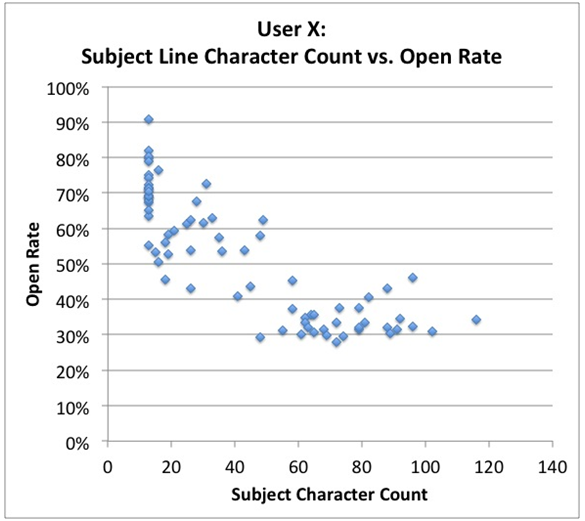
Subject character count vs Open rate graphs from MailChimp
But they also found examples where shorter subject lines fell flat, and longer descriptions scored the greatest number of opens:
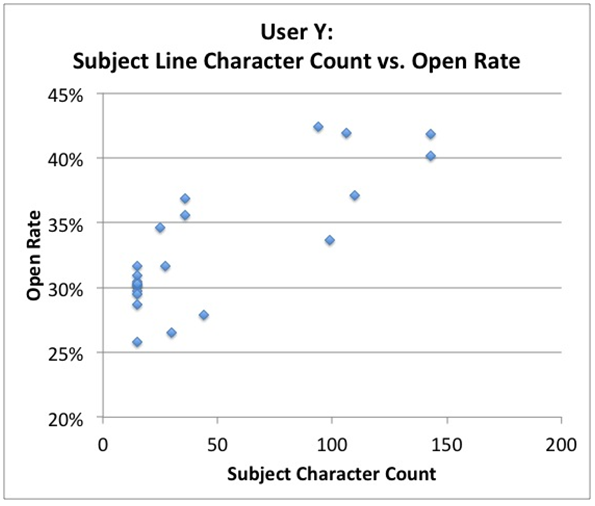
And here’s another analysis where subject line length made little or no difference at all!
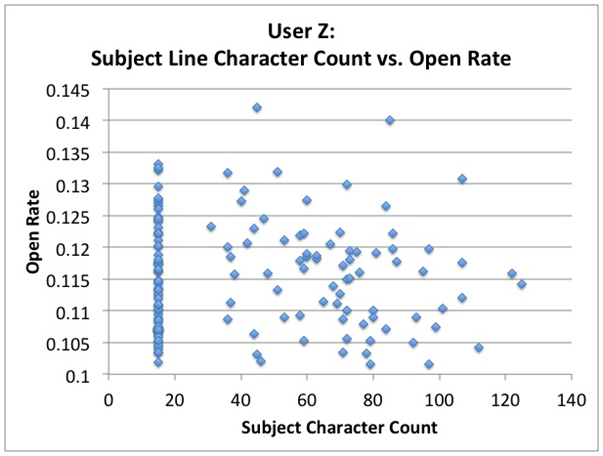
What can higher ed marketers learn from this data? That simply restricting characters will not guarantee an email open. According to SendGrid, relevancy is far more important than length when it comes to grabbing reader attention. If you’re focused solely on paring down line length, your admissions team could end up sacrificing on clarity or on truly targeting the needs of your most prevalent personas. You may end up with disappointing generic subjects, like:
![]()
VERSUS

Character-count never trumps content that your lead personas actually want to see, and need to know. The second subject is longer, yes, but it’s far more relevant and compelling than the first. Of course, getting to the point is best practice for crafting subject lines- particularly when optimizing for a mobile browser – but brevity alone shouldn’t be the guiding force behind your email marketing campaign.
Borrow From Blog Titles
You don’t need to re-invent the wheel. One way to quickly conceptualize everything we’ve discussed so far about email subject lines, is to think of them as effective blog titles. A lot of the same rules apply. Tried and tested techniques like the “How To” guide or “Top Ten” list work very well for higher ed subject lines – and they typically capture all of the elements we’ve touched on here: clarity, relevance, and concision. Consider these comparisons:

Your prospective student is more likely to open the second email for the same reason he or she would scan through a blog by the same title – because you’ve quantified the amount of reading the task entails, established clear expectations for what’s to come, AND you’ve used persona knowledge to create a message relevant to healthcare-oriented prospects. Perfect. Your recipient is primed to click and learn more about your program. Here’s another example for personas concerned about balancing work and study:
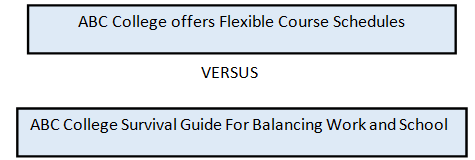
The second subject line tells recipients you’ve taken the time to put together a “How To” list that is pertinent to an issue that concerns them. This is inbound marketing 101 – offer thoughtful content that genuinely helps your leads succeed. So while we caution against following just one or two “rules” of thumb for crafting excellent subject lines, taking a lesson from blog titles can definitely offer a comprehensive go-to solution for busy admissions departments. Lines like these are relevant, to-the-point, and persona-driven. Which leads us to our next and final suggestion…
Use Student Persona-Powered Language
Much research has been compiled on the persuasive power of certain marketing words, such as BufferApp’s Words That Convert by Kevan Lee. Lee reminds his readers that regardless of objectives, industry, or target audience, the words we choose directly impact our marketing outcomes. Why? Because:
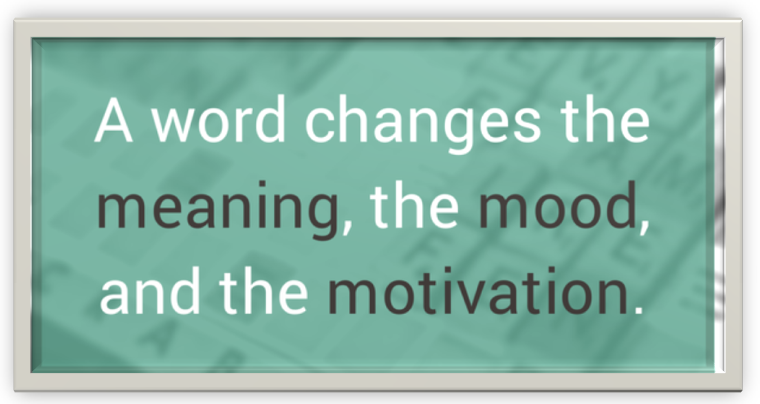
And when it comes to email subject lines, language choice has never been more important. It determines whether or not your message gets opened, which in turn determines the success of your school’s entire marketing initiative.
MailChimp urges marketers to “tell it, not sell it,” when crafting email subject lines. This is especially true for colleges who want to be known as institutions of learning, not profits-driven businesses. And the advice is in line with what we’ve discussed here already in terms of persona-worthy email subject lines. But one could (and should) push the concept of language power a step further by identifying the keywords most likely to resonate with specific student personas. What are your school’s main target audiences? Which keywords should you incorporate into your subject lines to help boost open rates?
For example, many colleges focus on affordability content to convert cost-conscious students. This is substantial proof about how your institution helps save students money on tuition, thereby lowering the amount of their post-school debt. If this issue is particularly important to your lead personas, why not incorporate affordability keywords into some of your email subject lines? These could include:
- Lower tuition
- Debtless degrees
- Affordable training
- Work-study program
- Job placement success
Using Kevin Lee’s list as a reference point is great – but schools shouldn’t sound like they’re hawking a product:

College marketers should make a list of appropriate keywords that apply to their target audiences, and craft compelling, clear, relevant email subject lines around those ideas:

Just be prepared to back up your claims in the body of your email and wherever its links may lead! But that’s a subject for another blog post…
How are your school’s email open rates? Do your subject lines truly reach out to and engage prospective students?
[originally published on Higher Education Marketing at http://www.higher-education-marketing.com/blog/email-subject-lines ]
You might be interested in...
- Top 10 Happiest Six-Figure Jobs in 2026 (That People Actually Enjoy)
- From a Childhood Dream to a Lifelong Vocation: Study Doctor of Medicine at UCSI
- Why Master's Degree Students are Encouraged to Continue Their PhD?
- Top Countries With the Most International Students
- Brazil Tops QS University Rankings for Latin America
- Updated: Malaysian universities continue to make progress in THE World University Rankings 2023
- New Zealand – A World-class Education Destination
- EdUHK – Nurturing Future Educators
- Careers That Would Be Sought After In The Future In Malaysia: Job Demand Guide
- Admissions Guide: Top 30 MBA Programs In USA





 +60173309581
+60173309581